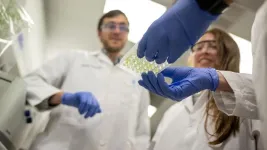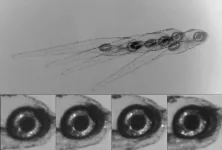(Press-News.org) A groundbreaking method for bridge construction is set to enhance performance, reduce construction time, and cut costs for future bridges across Texas.
Dr. Kinsey Skillen, assistant professor in the Civil and Environmental Engineering Department at Texas A&M University, was named Principal Investigator (PI) of the Texas Department of Transportation (TxDOT) research project titled “Develop/Refine Design Provisions for Headed and Hooked Reinforcement.”
The 42-month project, which received nearly $1 million in funding, is a joint effort between the Texas Transportation Institute and the University of Texas at San Antonio (UTSA) exploring more efficient methods of anchoring steel reinforcement in bridge structure joints to enhance structural performance and accelerate construction timelines.
One specific bridge structure being researched, known as a “straddle bent,” consists of two large columns and a beam to support elevated roadways. The reinforcing steel that joins the beam to the columns currently requires meticulous design and construction considerations. This research aims to provide TxDOT with updated design guidelines for using hooked and headed bars in bridge structures, supported by full-scale experimental testing.
An innovative approach currently under evaluation is the use of “headed bars,” which are reinforcing bars with a large nut-like head attached at the bar end to prevent it from being pulled out of the concrete. Full-scale straddle bent joints incorporating headed bars are currently undergoing construction and testing at the Center for Infrastructure Renewal’s High-Bay Laboratory.
This study will be the first of its kind to establish design provisions for the use of headed reinforcement in bridge structure applications, offering TxDOT bridge engineers robust design guidance for future projects.
Additional tests are being conducted at the Large-Scale Testing Laboratory at UTSA, led by Co-PI Dr. Adolfo Matamoros. Such tests focus on further understanding the load transfer mechanisms provided by hooked and headed bars in additional TxDOT bridge applications.
Skillen specializes in large-scale structural testing and the behavior of reinforced concrete structures. His research interests include field monitoring of structures, bond and anchorage of steel reinforcement, strengthening existing structures, shear and torsion, and structural applications of ultra-high-performance concrete.
By Katie Carroll, Texas A&M Engineering
###
END
New research aims to improve bridge construction in Texas
Texas A&M Engineer Dr. Kinsey Skillen leads a new 42-month TxDOT research project at the Center for Infrastructure Renewal.
2025-01-02
ELSE PRESS RELEASES FROM THIS DATE:
These bacteria perform a trick that could keep plants healthy
2025-01-02
To stay healthy, plants balance the energy they put into growing with the amount they use to defend against harmful bacteria. The mechanisms behind this equilibrium have largely remained mysterious.
Now, engineers at Princeton have found an answer in an unexpected place: the harmless, or sometimes beneficial, bacteria that cluster around plants’ roots.
In an article published Dec. 24 in the journal Cell Reports, researchers showed that some types of soil bacteria can influence a plant’s ...
Expanding the agenda for more just genomics
2025-01-02
Genomics is being integrated into biomedical research, medicine, and public health at a rapid pace, but the capacities necessary to ensure the fair, global distribution of benefits are lagging. A new special report outlines opportunities to enhance justice in genomics, toward a world in which genomic medicine promotes health equity, protects privacy, and respects the rights and values of individuals and communities.
The report, “Envisioning a More Just Genomics,” is a collaboration between ...
Detecting disease with only a single molecule
2025-01-02
UC Riverside scientists have developed a nanopore-based tool that could help diagnose illnesses much faster and with greater precision than current tests allow, by capturing signals from individual molecules.
Since the molecules scientists want to detect -- generally certain DNA or protein molecules -- are roughly one-billionth of a meter wide, the electrical signals they produce are very small and require specialized detection instruments.
“Right now, you need millions of molecules to detect ...
Robert McKeown recognized for a half century of distinguished service
2025-01-02
NEWPORT NEWS, VA – For nearly half a century, Robert D. “Bob” McKeown has probed nuclear particles and educated rising generations of physicists. Now, the former deputy director for science at the U.S. Department of Energy’s Thomas Jefferson National Accelerator Facility is being honored for his outstanding career contributions with the 2024 American Physical Society’s Division of Nuclear Physics (DNP) Distinguished Service Award.
McKeown is recognized for his work in experimental physics and his extensive leadership in the broader ...
University of Maryland awarded $7.8 million to revolutionize renewable energy for ocean monitoring devices
2025-01-02
University of Maryland researcher Stephanie Lansing received a Phase 1 $7.8M award from Defense Advanced Research Projects Agency (DARPA) to develop and test a biologically fueled energy source to power research and sensing devices throughout the world’s oceans.
There is a vast array of ocean sensing devices that provide critical information for understanding marine environments, monitoring climate change and maintaining national security. Many of these sensors are currently powered by long underwater cables or lithium-ion batteries.
Lansing is leading a large, collaborative effort that will overcome the need for batteries and ship-based or shore-based ...
Update: T cells may offer some protection in an H5N1 ‘spillover’ scenario
2025-01-02
Update: This LJI study was previously shared on bioRxiv in September 2024. Since then, health officials have reported a rise in H5N1 “bird flu” infections in humans, including the first severe H5N1 human case requiring hospitalization. Officials have also reported increased cases in feline species, including an outbreak among big cats at a wildlife sanctuary. In California, the recent spread of H5N1 to dairy herds in Southern California prompted Gov. Gavin Newsom to declare a “State of Emergency” on Dec. 18, 2024.
LA JOLLA, CA—New research led by scientists at La Jolla Institute for Immunology (LJI) ...
Newborn brain circuit stabilizes gaze
2025-01-02
An ancient brain circuit, which enables the eyes to reflexively rotate up as the body tilts down, tunes itself early in life as an animal develops, a new study finds.
Led by researchers at NYU Grossman School of Medicine, the study revolves around how vertebrates, which includes humans and animals spanning evolution from primitive fish to mammals, stabilize their gaze as they move. To do so they use a brain circuit that turns any shifts in orientation sensed by the balance (vestibular) system in their ears into an instant counter-movement by their eyes.
Called ...
Bats surf storm fronts during continental migration
2025-01-02
Birds are the undisputed champions of epic travel—but they are not the only long-haul fliers. A handful of bats are known to travel thousands of kilometers in continental migrations across North America, Europe, and Africa. The behavior is rare and difficult to observe, which is why long-distance bat migration has remained an enigma. Now, scientists from the Max Planck Institute of Animal Behavior (MPI-AB) have studied 71 common noctule bats on their spring migration across the European continent, providing a leap in understanding this mysterious behavior. Ultra-lightweight, intelligent sensors attached ...
Canadian forests are more prone to severe wildfires in recent decades
2025-01-02
Climate change is driving more intense wildfires in Canada, according to a new modeling study, with fuel aridity and rising temperatures amplifying burn severity, particularly over the last several decades. The findings underscore the growing impact of climate change on wildfire behavior, with the most severe effects concentrated in Canada’s northern forests. Fueled by ongoing climate change, Canada – one of the most forested and fire-prone regions in the Northern Hemisphere – is grappling with increasingly severe and prolonged wildfire seasons. ...
Secrets of migratory bats: They “surf” storm front winds to save energy
2025-01-02
A species of migrating bat “surfs” the warm winds of incoming storm fronts to conserve energy, according to a study that used tags to track the tiny animals on their long journeys across central Europe. The findings offer new insights into how weather, physiology, and environmental factors shape bats’ seasonal migration patterns. While bird migration is well-documented and studied, this is not the case for seasonal migration of bats – particularly the few long-distance, migratory species. These nocturnal travelers face substantial challenges, ...
LAST 30 PRESS RELEASES:
Cost of copper must rise double to meet basic copper needs
A gel for wounds that won’t heal
Iron, carbon, and the art of toxic cleanup
Organic soil amendments work together to help sandy soils hold water longer, study finds
Hidden carbon in mangrove soils may play a larger role in climate regulation than previously thought
Weight-loss wonder pills prompt scrutiny of key ingredient
Nonprofit leader Diane Dodge to receive 2026 Penn Nursing Renfield Foundation Award for Global Women’s Health
Maternal smoking during pregnancy may be linked to higher blood pressure in children, NIH study finds
New Lund model aims to shorten the path to life-saving cell and gene therapies
Researchers create ultra-stretchable, liquid-repellent materials via laser ablation
Combining AI with OCT shows potential for detecting lipid-rich plaques in coronary arteries
SeaCast revolutionizes Mediterranean Sea forecasting with AI-powered speed and accuracy
JMIR Publications’ JMIR Bioinformatics and Biotechnology invites submissions on Bridging Data, AI, and Innovation to Transform Health
Honey bees navigate more precisely than previously thought
Air pollution may directly contribute to Alzheimer’s disease
Study finds early imaging after pediatric UTIs may do more harm than good
UC San Diego Health joins national research for maternal-fetal care
New biomarker predicts chemotherapy response in triple-negative breast cancer
Treatment algorithms featured in Brain Trauma Foundation’s update of guidelines for care of patients with penetrating traumatic brain injury
Over 40% of musicians experience tinnitus; hearing loss and hyperacusis also significantly elevated
Artificial intelligence predicts colorectal cancer risk in ulcerative colitis patients
Mayo Clinic installs first magnetic nanoparticle hyperthermia system for cancer research in the US
Calibr-Skaggs and Kainomyx launch collaboration to pioneer novel malaria treatments
JAX-NYSCF Collaborative and GSK announce collaboration to advance translational models for neurodegenerative disease research
Classifying pediatric brain tumors by liquid biopsy using artificial intelligence
Insilico Medicine initiates AI driven collaboration with leading global cancer center to identify novel targets for gastroesophageal cancers
Immunotherapy plus chemotherapy before surgery shows promise for pancreatic cancer
A “smart fluid” you can reconfigure with temperature
New research suggests myopia is driven by how we use our eyes indoors
Scientists develop first-of-its-kind antibody to block Epstein Barr virus
[Press-News.org] New research aims to improve bridge construction in TexasTexas A&M Engineer Dr. Kinsey Skillen leads a new 42-month TxDOT research project at the Center for Infrastructure Renewal.





